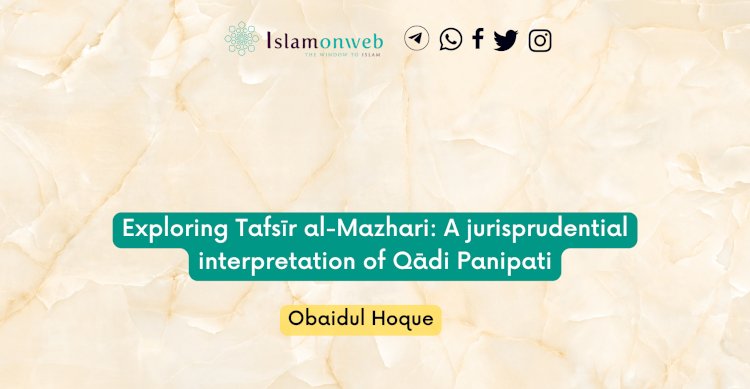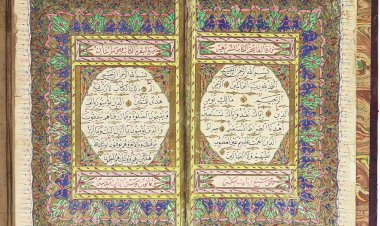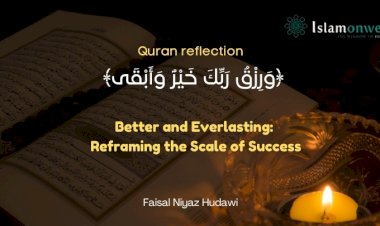Exploring Tafsīr al-Mazhari: A jurisprudential interpretation of Qādi Panipati
Over the centuries, many scholars from the Indian Peninsula have dedicated their lives studying the Quranic verses, language, historical context and related religious texts. It is with their meticulous exploration and profound insights, we are able to not only understand linguistic grip and literary aspects but also the moral, spiritual and ethical dimensions of the verses. However, efforts of these scholars are not as well-known as those of other famous figures in history, more specifically in the field of Arabic interpretations of the Holy Quran. In the list of the prolific Arabic interpretations of the Quran by Indian scholars are Garaibul Qur’an wa Raga’ib al-Furqan of Nizam al-Din al-Hasan bin Muhammad bin Al-Hussain al-Shafi’i al-Dawlat Abadi al-Qummi al-Nisaburi, Fatah al-Bayan fi Tafsir al-Qur’an of al-Amir Siddique Hassan Khan Al-Qunuji, Tafseerul Qur’an bi-kalam-ir-rahman of Sheikh Al-Islam Abu Al-Wafa Amritsari, and Tafsīr Al-Mazhari Al-Qadi Thana Allah Al-Hanafi Al-Panipati.
Among these, Tafsīr al-Mazhari is known for its jurisprudential brilliance. With a major focus on jurisprudence, this exegesis brings in invaluable insights into the legal aspects of the Quranic verses. This interpretation leaving a lasting impact on Islamic scholarship, is a reference for seekers of knowledge and jurists at the same time.
Qādi Panipati & Sufism
Sanaullah Panipati al-Mazhari was born in the year (1143 AH) or a year before it and died on the 1st of Rajab (1225 AH) in his hometown Panipat, Haryana, India. As for his upbringing and his family, little is known about him except that he grew up in the town of "Panipat" and began to seek knowledge at the hands of its Islamic scholars there. He memorized the Holy Qur'an when he was only seven years old. He used to pray one hundred times (rak'ahs) every day, and read from the Holy Qur'an, one of the seven parties, despite the lack of time between seeking knowledge, teaching students, and classifying books.
This implies how considerate Qādi Panipati was regarding spiritual needs and feeds. Since childhood, he found it quite fascinating to spend time working on the concept of Sufism and thus he grew up as a sufi. According to the custom of his ancestors, he learned the works of Sufism and mastered the four methods known within the community as fundamentals of mystic life. For this, he surrounded himself with origins and branches of Sufism and stood on its secrets little by little until he was influenced by the Sufi order of Naqshbandi. Later on, he became one of elders of the Naqshbandi order of the Mujaddiday, and this could be felt from his interpretation as the Sufi trend has got a prominent place in his masterpiece Tafsīr al-Mazhari.
Journey of Seeking Knowledge
Among the major educational journeys of Qādi Panipati, is the journey of Delhi where he adhered to the renowned scholar Shah Waliullah Dehlawi and took hadith and jurisprudence from him. Apart from this, he has been to different other places in search of knowledge and spent his life exploring sciences, resolving disputes, and issuing questions to disputing groups.
Among his sheikhs, there are several other leading scholars of his time such as, Sheikh Ahmed bin Abdul-Ahad Al-Sarhindi, Muhammad Abed Al-Hanafi Al-Naqshbandi Al-Sunami Al-Lahuri, and Shams al-Din Habibullah Mirza Jan Janan al-Alawi al-Dehlawi. Qādi Panipati learned mysticism from Mirza Jan Janan Mazhar to whom he was quietly influenced by and later on dedicated the title of his tafsīr, Tafsīr al-Mazhari. As a matter of fact, there are only a few students who have had the opportunity of taking knowledge and learning things from him as he used to be preoccupied with spiritual exercises quite often. Referring to this, in An-Nuzhat al-Khawatir, it has been quoted: “And he reads from the Holy Qur’an one of its seven parties, while he is busy with remembrance, monitoring, and teaching students, classifying books, and separating cases.”
Literary Works
Qādi Panipati enriched the Islamic heritage with several Islamic books of diverse sciences and arts. Among these, some of the prolific ones are Tafsīr al-Mazhari, Mā Lā Budda Minhu, Irshād al-Talibān fi al-suluk, Tazkirat al-Ma’ad, Kitab Mabsūt fi al-Fiqh, Risalat fi Hukmi al-Ganna, Risalat fi al-Ushr wa al-Kharaj, Haqiqat al-Islam, Tadhkirat al-Mauta wa al-Qubur, and As-saiful Maslul fi Raddi al-Shia.
Tafsīr al-Mazhari
Tafsīr al-Mazhari is an exegesis that includes discussion on various legal issues (umūr al-Fiqh) related to the verses. He bases his conclusions on valid scholarly sources such as the Quran, the Sunnah, other verses of the Quran, and the views of past Islamic scholars. These sources are all taken into consideration before presenting a legal ruling in relation to a particular verse of the Quran.
In his tafsīr, Qādi Panipati divides the verses into five categories while discussing the Quranic laws and their relevance. It is considered one of the long interpretations because its author elaborated on the interpretation of the verses and branched out a lot in them. This will become clear while talking about his approach and methodology to interpreting the verses of rulings, and the sayings of the companions and followers. In doing so, he was also interested in mentioning the reasons for the revelation (asbāb al-nuzūl), the abrogator (nāsikh), and the abrogated (mansūkh).
In it, he reviewed a lot of frequent, abnormal, and fabricated Quranic readings with guidance and weighting between them. He presented a dialogue on jurisprudential issues and mentioned the branches of issues and the opinions of jurists in the matter, which he greatly weighted among the sayings. Throughout the interpretation, Qādi Panipati followed the methodology of Imam al-Zamakhshari, Imam Naṣir ad-Din al-Bayḍawi, and many others which lead up to the better excellence of the arrangement of the insights and the indications needed. Even so, not even a single trace of the Israeli narrative could be found as Qādi Panipati was concerned with the Quranic expression and the meaning it entails.
In-depth jurisprudence in Tafsīr al-Mazhari
This tafsīr is considered to be one of the most important exegeses of the Qur’an and has been widely studied and used by many scholars throughout the centuries. One of the most important aspects of Tafsīr al-Mazhari is its use of jurisprudence. Qādi Panipati was a renowned jurist and was very knowledgeable in the field of Islamic law. He used his knowledge of jurisprudence to explain the verses of the Qur’an in a way that was easy to understand and applicable to everyday life. He also used his knowledge of jurisprudence to explain the rulings of the Qur’an and how they should be applied in different situations.
Tafsīr al-Mazhari is an important source of knowledge for many Muslims, and its use of jurisprudence is one of the reasons why it is so highly regarded. But this tafsīr does not delve deeply into the intricacies of Islamic law. While Qādi Panipati does provide some guidance on fiqh, it is limited and often does not provide a comprehensive view of the topic. This is especially true when it comes to the more complex aspects of Islamic law, such as family law, inheritance, and contracts.
Conclusion Note
An important name in the Qur'anic services of Indian scholars is Tafsīr al-Mazhari. This book is written in Arabic language and consists of ten volumes. This exegesis shows the prudence of author Qādi Panipati in the case of beatifically highlighting dichotomy within a particular issue and without taking any bias stance. Throughout the tafsīr, he elegantly explained every confrontation with different opinions and quoting various reliable sources and references.
To encapsulate, this tafsīr starkly deals with so many jurist issues and it is a resourceful reference in case of jurisprudence exegesis, but it is not to be a direct reliable source for jurisdiction. There has been a handful of research done in the English language on this very subject and further research is recommended. Even after all these researches, not even a single trace of Israelite narrative has been found as it is claimed by some. Finally, this mastery of this exemplary Quran scholar should be acknowledged in the academic sphere and there should be more secondary works on his works’ criticism.
Reference
Al-Bagdadi, Ismail Basha. Hadiyatul Arifeen. Istanbul : maktabatul islamia, Tehran, 1955.
Algaori, Abdul Majid. “Tafasirul Qur'an al-karim liulama-il Hind .” The 6th Annual International Qur'anic Conference. University of Malaya, 2016. 9-15.
al-Hasani, Abd al-Hayy. athakafatul islamia fil hind. Beirut, 2004.
Al-Hassan, Professor Imad. Book of Islamic sciences in Muslim India. Delhi: Jame Nawi Library, Delhi Limited, 1982.
al-Husayni, Allama Sharif Abd al-Hay. Nuzhat al-Khawatir wa đaj al-Masaa wa’l-Nazir. Second Edition. Beirut, 1999.
Al-panipati, AL-Qadi Muhammad Sanaullah Al-usmani Al-madhari. Tafseer Al-Madhari. Beirut: Dar ehia altourath alarabi, 2004.
Anwar, Mohd Sayeed. “An Analytical Study of Al-Tafsir al-Mazhari.” Jamia Millia Islamia. 26 1 2023 <http://www.jmi.ac.in>.
Khalid, Dr. Muhammad Iyaz and Muhammad. “The analytical review of Qazi Sana ullah Pathy’s methods and style in Tafseer Mazahari.” Islami-tahdhib-o-thakafat (2018): 42-50.
Mahmood, Dr. Sajida Taha. Al-Imam Al-Madhari wa Manhajuhu fi Tafseerihi. Baghdad: Jamia Baghdad, n.d.
Sarhindi, Imam Ahmed. Maktubat-e-imam Rabbani. Beirut: Darul Kutub Ilmia, n.d.
Sialkauti, Muhammad Basheer. Shah Waliullah Dehlavi: His life and Preach. Beirut: Dar Ibn Hazm, 1999.
About the author
Obaidul Hoque is a PG student at the department of Civilizational Studies, Darul Huda Islamic University.
Disclaimer
The views expressed in this article are the author’s own and do not necessarily mirror Islamonweb’s editorial stance.
























Leave A Comment